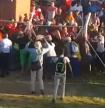On Monday 22 February, there was a violent clash between (mostly white) rugby players and supporters and (exclusively black) students and workers (protesters). I am a white Afrikaans man. I grew up getting in fights, never with sticks, knives etc. but fists happened often when boys or young men disagreed. I am not condoning violence, but it is a fact that for a lot of young men fists are an appropriate way to handle conflict. Let’s also not forget the covert punches in the scrum. Rugby is an aggressive, “violent” testosterone driven game.
The protest mentality in South Africa is to be violent without being violent. Protesters provoke by being physically in places where they are not allowed and not responding to commands to leave or back away. When they are then physically removed, they are the “victims” of violence.
I am not going to go into a debate about the relative importance of a rugby match vs the protesters demands. There can be no debate, rugby is just a game after all. The issue is about rights and when some rights are seen as only applying sometimes, we are on a slippery slope.
People have a right to congregate, protest, sing songs etc. I have a right to swing my fist. My right ends exactly where your face starts.
Does a university have the right to stage a rugby match on its property? Surely it does. Do students have a right to attend said match and support their team? Surely they do. Do protesters have a right to stop said match? Surely they do not. So the protesters were infringing on the rights of both the university and the spectators.
The proper course of action would have been to get campus security or the police to remove the protesters. Had that happened, the protesters would have complained about police brutality. What does outsourcing – which had been and is being discussed – have to do with rugby playing students?
Marching onto the field and disrupting the game was purely provoking violence by thumbing noses and saying “What are you going to do about it?” Well, the protesters found out what the fans were going to do about it.
One protester said in an interview after the fracas that five men came to them saying that they should leave and that more people would come. “Let them come” was the reply. Then they came and everyone was shocked.
Anyone reading this is by now very angry with me, calling me the worst kind of violent racist and chanting “black lives matter”.
I have two responses to that. Firstly, if the UFS hockey team (mostly white) had done what the protesters did – they would have been protesting that rugby gets more funding - exactly the same thing would have happened. Race had nothing to do with it. Their protest would at least have been relevant to rugby.
Secondly, just to see who is racist, me or the reader, I would like to sketch the following scenario. There is a soccer game between UFS and NMBU. 50 White protesters take to the field, after forcing their way into the grounds and assaulting a young black woman in the process, then stopping the game to protest against high electricity tariffs. Again, this would have nothing to do with the game or the spectators.
I will speculate that, if police and security did nothing to quickly resolve the situation, the soccer fans (mostly black) would themselves violently evict the protesters from the stadium. I will further speculate that this too would be considered a racist encounter. I will further suggest that it would be the white protesters who would be condemned as the racists for provoking peaceful black soccer supporters who have nothing to do with their demands/grievances.
In my opinion, racism is treating one race as inferior to another purely by virtue of race, not actions. Calling the UFS incident racist holds white spectators to a higher standard than black protesters thereby implying black inferiority. That in itself is racist.

